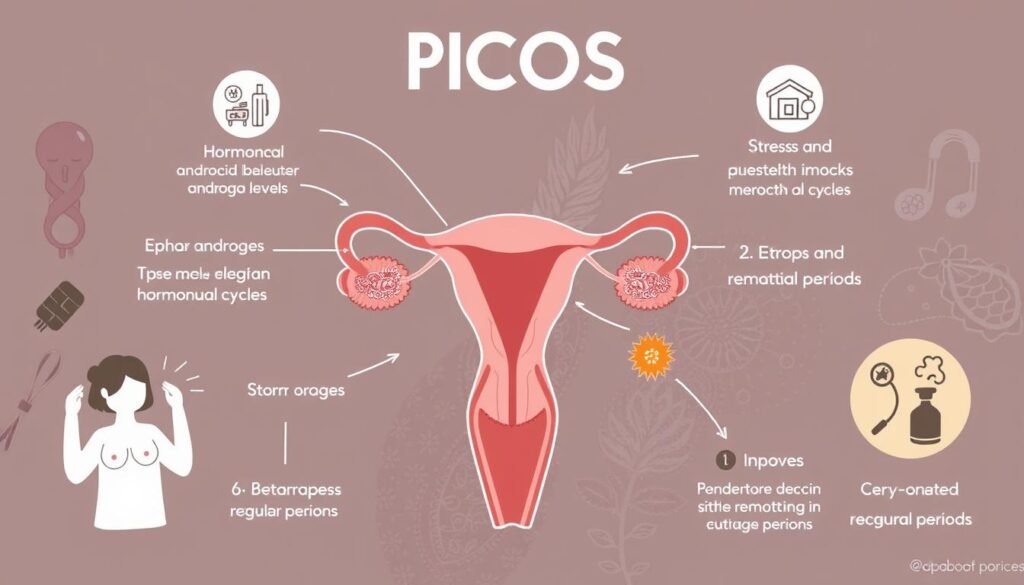About 1 in 10 women of childbearing age have Polycystic Ovary Syndrome (PCOS). This disorder causes irregular periods and raises the risk of infertility, among other issues. It comes with symptoms like too much androgen and insulin resistance. Knowing about PCOS spotting helps us understand its impact on menstrual cycles and spotting.
While PCOS can’t be totally reversed, knowing its causes and how to manage it can really improve life. Treatment options include hormone therapy and lifestyle adjustments. These are key to handling symptoms such as irregular periods. For more on what leads to missed or heavy periods, visit understanding the causes.
Key Takeaways
- PCOS affects about 5% to 10% of women during their reproductive years.
- Irregular periods are a common symptom linked to hormonal imbalances in women with PCOS.
- Insulin resistance plays a significant role in the development of conditions related to PCOS.
- Treatment strategies can include birth control pills and lifestyle modifications.
- Untreated PCOS can lead to severe complications such as type 2 diabetes and heart disease.
- Early diagnosis and intervention are vital for managing symptoms and risks.
Understanding PCOS: An Overview
Polycystic Ovary Syndrome (PCOS) is a common hormonal disorder. It affects 8–13% of women of childbearing age. This condition can cause multiple small, fluid-filled sacs in the ovaries, known as ovarian cysts. These cysts may lead to irregular periods and high androgen levels.
The exact causes of PCOS are still being studied. However, insulin resistance, genetics, and environmental factors might play a role. Shockingly, about 70% of women with PCOS might not even know they have it. This unawareness can seriously affect their health and happiness.
PCOS symptoms include unwanted hair growth, acne, weight gain, and trouble getting pregnant. It’s vital to diagnose and treat PCOS early. This helps avoid serious problems like diabetes and heart disease later on. Additionally, many women with PCOS struggle with feelings of anxiety and depression. This struggle can be worse due to societal pressures and feeling bad about their body image.
PCOS can lead to other health issues too, not just those related to having babies. It can cause an increase in hormones like testosterone, estrogen, and insulin. Dealing with PCOS often involves making changes in your lifestyle. Medications like birth control pills can also help. They make periods more regular and ease other symptoms. To learn more about PCOS, check out this informative article.
| Aspect | Details |
|---|---|
| Prevalence | Affects 8–13% of reproductive-aged women |
| Diagnosis Rate | Up to 70% remain undiagnosed |
| Main Causes | Hormonal imbalances such as insulin resistance |
| Common Symptoms | Irregular periods, hirsutism, acne, weight gain |
| Potential Risks | Type 2 diabetes, cardiovascular issues, obesity |
What is PCOS Spotting?
PCOS spotting is unexpected bleeding between your periods because of polycystic ovary syndrome. This syndrome messes with how your body handles your menstrual cycle. It can make periods irregular, cause spotting, or even lead to longer cycles. Because of PCOS, some women might only get six to eight periods a year, which isn’t great for their menstrual health.
About 10% of women have PCOS, and it often messes with their periods. Spotting comes from when ovulation doesn’t happen right, making hormone levels go crazy. This can make period patterns unpredictable. That’s why it’s super important to talk to a doctor if you’re having these issues. They can help figure out what’s going on and find ways to manage it.
If you’re noticing spotting, it could be part of a bigger issue with your menstrual health. Things like endometriosis, which affects over 11% of women of childbearing age, and conditions like fibroids could also cause it. It’s crucial to see a specialist to get to the bottom of what’s causing irregular bleeding. They can help make sure you get the right treatment.
| Condition | Prevalence |
|---|---|
| PCOS | 10% of women |
| Endometriosis | More than 11% of women |
| Pregnancy Ending in Miscarriage | Up to 20% |
| Women with Fibroids by Age 50 | Up to 80% |
| Normal Menstrual Cycle Length | 21 to 35 days |
Causes of Irregular Periods in PCOS
Irregular periods often worry women with polycystic ovary syndrome (PCOS). The main issue is a hormone imbalance. High levels of androgens and insulin resistance mess up ovulation cycles. Many teenagers and young women see changes in their periods because of PCOS.
Studies show women with PCOS have more androgens than usual. These hormones can stop the body from ovulating regularly. This leads to periods that are hard to predict. Some women might not ovulate at all, causing big changes in their menstrual cycles.
Insulin resistance and hormone imbalance both play a big part in PCOS. Over half the women with PCOS have high insulin and glucose. This can lead to diabetes and metabolic syndrome. These issues make ovulation difficult, making irregular periods even harder to handle.
Below is a table summarizing key aspects related to the causes of irregular periods in PCOS:
| Factor | Description |
|---|---|
| Hormone Imbalance | Higher levels of androgens can disrupt ovulation and menstrual cycles. |
| Insulin Resistance | Excess insulin can lead to increased androgen production and affect menstrual regularity. |
| Ovulation | Irregular or missed ovulation results in unpredictable or absent periods. |
| Long-Term Risks | PCOS can lead to infertility, diabetes, and other metabolic concerns. |
Knowing about PCOS complexities helps in making good treatment plans. These aim to get regular periods back and handle symptoms.

Hormonal Imbalances and PCOS Spotting
Hormonal imbalances play a big role in pcos spotting and period problems. Many women with PCOS have periods that come rarely or not at all. This is due to the imbalance. A lot of them have androgen levels that are too high, which messes up their cycles. These extra male hormones stop ovulation. This can cause other health issues too.
Impact of Androgens
High androgen levels can cause trouble for women’s reproductive systems. These women might have a thickened endometrium, or womb lining. Sometimes it gets as thick as 11 mm. This can lead to serious bleeding and even endometrial hyperplasia. Because of high androgens, some women also bleed after sex. This is often from cysts or polyps that have burst.
Role of Insulin Resistance
Insulin resistance is a big deal in PCOS. About 70% of women with the condition struggle with it. It makes the body produce more androgens. This worsens menstrual irregularities and can raise the risk of abnormal cell growth. It might even lead to cancer. Managing insulin resistance with lifestyle changes or medicine can help. It might make periods more regular.

It’s important to know about these issues if you’re dealing with PCOS. If you want to learn more about what can cause vaginal bleeding, there’s a great resource here. It goes over different reasons and urges women to get checked for unusual bleeding.
Symptoms Associated with PCOS
PCOS affects women’s health and lifestyle in many ways. One key PCOS symptom is irregular periods. This may include missed cycles or unexpected bleeding. Women might see changes in their cycle lengths. This can greatly impact their hormonal health and life.
Common Symptoms of Irregular Periods
Those with irregular periods from PCOS face several issues. Symptoms can range from:
- Having fewer than six to eight periods a year
- Experiencing unpredictable cycle lengths
- Dealing with heavy or painful periods, which could lead to anemia
Other Symptoms of PCOS
PCOS brings about more than just menstrual issues. Other symptoms include:
- Hirsutism, or unwanted hair in male-pattern areas like the chin or chest
- Acne, especially adult acne tied to hormone changes
- Weight gain, often linked to insulin problems, seen in PCOS patients
- Mood issues, such as anxiety and depression
- A higher chance of sleep apnea, especially if overweight
- Risks like infertility or cancer in the uterine lining
It’s crucial to recognize PCOS symptoms early. Diagnosing and finding the right support can improve one’s lifestyle. Women who experience these symptoms should consult a healthcare professional. They can guide you through managing PCOS effectively.

| Symptom | Description |
|---|---|
| Irregular Periods | Menstrual cycles that don’t follow a regular pattern, leading to missed periods. |
| Hirsutism | Unusual hair growth in places more common for men, due to hormone imbalance. |
| Acne | Continuous skin breakouts linked to hormonal imbalances related to reproduction. |
| Weight Gain | Putting on weight due to resistance to insulin, often seen in those with PCOS. |
| Emotional Disturbances | Experiencing a lot of anxiety, depression, or mood swings that disrupt daily activities. |
Diagnosing PCOS Spotting
To diagnose PCOS, doctors use a detailed method. They look into the patient’s medical history and talk about PCOS symptoms. Symptoms include inconsistent periods and signs of high androgen levels.
A pelvic exam is a key strategy for diagnosis. During the exam, a doctor checks the uterus, ovaries, and other organs. They do this by feeling the abdomen while inserting fingers into the vagina. This helps find any anomalies pointing to PCOS.
Blood tests play a vital role in diagnosing PCOS. They measure hormonal balance to exclude other similar conditions. These tests include checking for insulin resistance, a frequent issue in PCOS patients. This approach gives a comprehensive view of the patient’s hormonal health.
Ultrasounds are also a common tool in PCOS diagnosis. They use sound waves to show the pelvic organs clearly. This helps doctors check the ovaries and the thickness of the uterine lining, important in identifying PCOS.
People with PCOS should regularly monitor their blood pressure, cholesterol, and triglycerides. This is crucial as PCOS increases the risk of heart disease and metabolic problems.
Making lifestyle changes is advised for managing PCOS. Studies show that exercise and a healthy diet can greatly improve symptoms. Early and precise diagnosis of PCOS helps create a personalized treatment plan. This plan focuses on symptom management and enhancing life quality.
| Diagnostic Method | Description |
|---|---|
| Pelvic Exam | Assessment of reproductive organs via physical examination. |
| Blood Tests | Measurement of hormone levels and assessment of insulin resistance. |
| Ultrasound | Imaging of pelvic organs to observe ovarian structure and uterine lining thickness. |
| Regular Health Check-ups | Monitoring of blood pressure, cholesterol, and triglyceride levels. |
Management Strategies for PCOS Spotting
To handle PCOS spotting well, you should consider medical and lifestyle changes. Such strategies help relieve symptoms and boost your life quality.
Role of Birth Control Pills
Birth control pills are key in handling PCOS. They make menstrual cycles regular, lower androgen levels, and cut the risk of endometrial cancer. They don’t cure PCOS but ease symptoms like odd spotting. This leads to a more predictable period flow and less stress over cycle irregularities.
Using Metformin for Treatment
Metformin works well for PCOS by improving insulin use and sparking ovulation. It’s great for those battling weight gain from insulin issues. Research shows it can also decrease cholesterol, boosting metabolism. Metformin is often used with other strategies and lifestyle changes to restore regular ovulation.
Lifestyle Modifications
Making lifestyle changes is critical to managing PCOS. Regular workouts and a balanced diet assist in weight control, essential since obesity worsens PCOS symptoms. See below helpful tips:
- Dietary Adjustments: Choose a low-glycemic diet with plenty of fruits, vegetables, whole grains, and lean proteins.
- Regular Exercise: Aim for at least 150 minutes of moderate activity weekly to help lose weight and balance hormones.
- Stress Management: Try yoga, meditation, or deep-breathing exercises to lower stress and enhance well-being.
These lifestyle modifications can greatly aid in PCOS management, leading to better symptom management and improved reproductive health.
| Strategy | Description | Potential Benefits |
|---|---|---|
| Birth Control Pills | Regulate cycles and reduce androgen levels. | Predictable menstrual flow and symptom relief. |
| Metformin | Improves insulin sensitivity and stimulates ovulation. | Weight management and improved metabolic health. |
| Lifestyle Changes | Includes diet, exercise, and stress management. | Improved symptom control and hormonal balance. |
Complications of Untreated PCOS
Women with polycystic ovary syndrome (PCOS) face serious complications if they ignore the condition. One big worry is infertility. It affects many because their ovulation is irregular. This problem makes it hard for them to conceive, which is difficult for those wanting to start families.
Infertility Concerns
Infertility is a big problem for women with PCOS. The syndrome’s hormonal imbalances disrupt ovulation. This makes getting pregnant very hard. However, early diagnosis and treatment can help. It’s important to understand how PCOS affects fertility to manage it well.
Long-Term Health Risks
Not handling PCOS can do more than harm your reproductive health. It can lead to long-term issues like diabetes and heart disease. Studies say over half of those with PCOS could get type 2 diabetes by 40. Cardiovascular disease risk also increases with age, highlighting the seriousness of untreated PCOS.
PCOS can also bring other health problems like a higher chance of endometrial cancer and sleep apnea. Knowing these risks underlines the importance of early diagnosis and treatment. To learn more about PCOS complications, visit this informative source.
| Complication | Potential Risk Factors | Notes |
|---|---|---|
| Infertility | Irregular ovulation | Common in many women with PCOS |
| Type 2 Diabetes | Insulin resistance | More than half of women may develop by age 40 |
| Cardiovascular Disease | Aging, obesity | Higher risk with untreated PCOS |
| Endometrial Cancer | Chronic anovulation | Risk is three times greater than average |
Conclusion
Understanding PCOS is important for women who have symptoms like irregular periods. It affects at least 7% of adult women in the U.S. This condition does more than affect the reproductive system; it can also lead to health risks.
These risks include things like heart disease and diabetes. To manage PCOS well, women need both medical care and lifestyle changes. These efforts can make life better for many.
Managing PCOS requires a detailed plan. Women should work with healthcare providers to create a treatment plan. This plan should meet their specific health goals and needs. Changing your diet and exercise habits helps a lot, especially with insulin issues.
By understanding PCOS fully, women can take steps to lessen its impact. This means looking at the whole picture, not just parts of it.
The need for early diagnosis and specific management plans is critical in dealing with PCOS. With the right support and resources, many women can handle PCOS symptoms better. Being informed and advocating for your health is the key to a healthy life, even with PCOS.